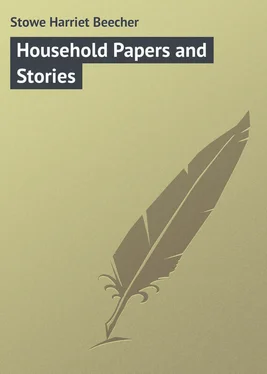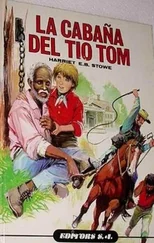Harriet Stowe - Household Papers and Stories
Здесь есть возможность читать онлайн «Harriet Stowe - Household Papers and Stories» — ознакомительный отрывок электронной книги совершенно бесплатно, а после прочтения отрывка купить полную версию. В некоторых случаях можно слушать аудио, скачать через торрент в формате fb2 и присутствует краткое содержание. Жанр: foreign_prose, на английском языке. Описание произведения, (предисловие) а так же отзывы посетителей доступны на портале библиотеки ЛибКат.
- Название:Household Papers and Stories
- Автор:
- Жанр:
- Год:неизвестен
- ISBN:нет данных
- Рейтинг книги:3 / 5. Голосов: 1
-
Избранное:Добавить в избранное
- Отзывы:
-
Ваша оценка:
- 60
- 1
- 2
- 3
- 4
- 5
Household Papers and Stories: краткое содержание, описание и аннотация
Предлагаем к чтению аннотацию, описание, краткое содержание или предисловие (зависит от того, что написал сам автор книги «Household Papers and Stories»). Если вы не нашли необходимую информацию о книге — напишите в комментариях, мы постараемся отыскать её.
Household Papers and Stories — читать онлайн ознакомительный отрывок
Ниже представлен текст книги, разбитый по страницам. Система сохранения места последней прочитанной страницы, позволяет с удобством читать онлайн бесплатно книгу «Household Papers and Stories», без необходимости каждый раз заново искать на чём Вы остановились. Поставьте закладку, и сможете в любой момент перейти на страницу, на которой закончили чтение.
Интервал:
Закладка:
“Pray keep common sense uppermost in the girls’ heads, if you can,” said I to Mrs. Crowfield, “and don’t let the poor little puss spend her money for what she won’t care a button about by and by.”
“I shall try,” she said; “but you know Marianne is inexperienced, and Jenny is so ardent and active, and so confident, too. Then they both, I think, have the impression that we are a little behind the age. To say the truth, my dear, I think your papers afford a good opportunity of dropping a thought now and then in their minds. Jenny was asking last night when you were going to write your next paper. The girl has a bright, active mind, and thinks of what she hears.”
So flattered, by the best of flatterers, I sat down to write on my theme; and that evening, at firelight time, I read to my little senate as follows: —
I have shown that a dwelling, rented or owned by a man, in which his own wife keeps house, is not always, or of course, a home. What is it, then, that makes a home? All men and women have the indefinite knowledge of what they want and long for when that word is spoken. “Home!” sighs the disconsolate bachelor, tired of boarding-house fare and buttonless shirts. “Home!” says the wanderer in foreign lands, and thinks of mother’s love, of wife and sister and child. Nay, the word has in it a higher meaning hallowed by religion; and when the Christian would express the highest of his hopes for a better life, he speaks of his home beyond the grave. The word “home” has in it the elements of love, rest, permanency, and liberty; but, besides these, it has in it the idea of an education by which all that is purest within us is developed into nobler forms, fit for a higher life. The little child by the home-fireside was taken on the Master’s knee when he would explain to his disciples the mysteries of the kingdom.
Of so great dignity and worth is this holy and sacred thing, that the power to create a HOME ought to be ranked above all creative faculties. The sculptor who brings out the breathing statue from cold marble, the painter who warms the canvas into a deathless glow of beauty, the architect who built cathedrals and hung the world-like dome of St. Peter’s in midair, is not to be compared, in sanctity and worthiness, to the humblest artist who, out of the poor materials afforded by this shifting, changing, selfish world, creates the secure Eden of a home.
A true home should be called the noblest work of art possible to human creatures, inasmuch as it is the very image chosen to represent the last and highest rest of the soul, the consummation of man’s blessedness.
Not without reason does the oldest Christian church require of those entering on marriage the most solemn review of all the past life, the confession and repentance of every sin of thought, word, and deed, and the reception of the holy sacrament; for thus the man and woman who approach the august duty of creating a home are reminded of the sanctity and beauty of what they undertake.
In this art of homemaking I have set down in my mind certain first principles, like the axioms of Euclid, and the first is, —
No home is possible without love.
All business marriages and marriages of convenience, all mere culinary marriages and marriages of mere animal passion, make the creation of a true home impossible in the outset. Love is the jeweled foundation of this New Jerusalem descending from God out of heaven, and takes as many bright forms as the amethyst, topaz, and sapphire of that mysterious vision. In this range of creative art all things are possible to him that loveth, but without love nothing is possible.
We hear of most convenient marriages in foreign lands, which may better be described as commercial partnerships. The money on each side is counted; there is enough between the parties to carry on the firm, each having the appropriate sum allotted to each. No love is pretended, but there is great politeness. All is so legally and thoroughly arranged that there seems to be nothing left for future quarrels to fasten on. Monsieur and Madame have each their apartments, their carriages, their servants, their income, their friends, their pursuits, – understand the solemn vows of marriage to mean simply that they are to treat each other with urbanity in those few situations where the path of life must necessarily bring them together.
We are sorry that such an idea of marriage should be gaining foothold in America. It has its root in an ignoble view of life, – an utter and pagan darkness as to all that man and woman are called to do in that highest relation where they act as one. It is a mean and low contrivance on both sides, by which all the grand work of home-building, all the noble pains and heroic toils of home education – that education where the parents learn more than they teach – shall be (let us use the expressive Yankee idiom) shirked .
It is a curious fact that, in those countries where this system of marriages is the general rule, there is no word corresponding to our English word “home.” In many polite languages of Europe it would be impossible neatly to translate the sentiment with which we began this essay, that a man’s house is not always his home.
Let any one try to render the song, “Sweet Home,” into French, and one finds how Anglo-Saxon is the very genius of the word. The structure of life, in all its relations, in countries where marriages are matter of arrangement and not of love, excludes the idea of home.
How does life run in such countries? The girl is recalled from her convent or boarding-school, and told that her father has found a husband for her. No objection on her part is contemplated or provided for; none generally occurs, for the child is only too happy to obtain the fine clothes and the liberty which she has been taught come only with marriage. Be the man handsome or homely, interesting or stupid, still he brings these.
How intolerable such a marriage! we say, with the close intimacies of Anglo-Saxon life in our minds. They are not intolerable, because they are provided for by arrangements which make it possible for each to go his or her several way, seeing very little of the other. The son or daughter, which in due time makes its appearance in this ménage, is sent out to nurse in infancy, sent to boarding-school in youth, and in maturity portioned and married, to repeat the same process for another generation. Meanwhile father and mother keep a quiet establishment and pursue their several pleasures. Such is the system.
Houses built for this kind of life become mere sets of reception-rooms, such as are the greater proportion of apartments to let in Paris, where a hearty English or American family, with their children about them, could scarcely find room to establish themselves. Individual character, it is true, does something to modify this programme. There are charming homes in France and Italy, where warm and noble natures, thrown together perhaps by accident, or mated by wise paternal choice, infuse warmth into the coldness of the system under which they live. There are in all states of society some of such domesticity of nature that they will create a home around themselves under any circumstances, however barren. Besides, so kindly is human nature, that Love, uninvited before marriage, often becomes a guest after, and with Love always comes a home.
My next axiom is, —
There can be no true home without liberty.
The very idea of home is of a retreat where we shall be free to act out personal and individual tastes and peculiarities, as we cannot do before the wide world. We are to have our meals at what hour we will, served in what style suits us. Our hours of going and coming are to be as we please. Our favorite haunts are to be here or there; our pictures and books so disposed as seems to us good; and our whole arrangements the expression, so far as our means can compass it, of our own personal ideas of what is pleasant and desirable in life. This element of liberty, if we think of it, is the chief charm of home. “Here I can do as I please,” is the thought with which the tempest-tossed earth-pilgrim blesses himself or herself, turning inward from the crowded ways of the world. This thought blesses the man of business, as he turns from his day’s care and crosses the sacred threshold. It is as restful to him as the slippers and gown and easy-chair by the fireside. Everybody understands him here. Everybody is well content that he should take his ease in his own way. Such is the case in the ideal home. That such is not always the case in the real home comes often from the mistakes in the house-furnishing. Much house-furnishing is too fine for liberty.
Читать дальшеИнтервал:
Закладка:
Похожие книги на «Household Papers and Stories»
Представляем Вашему вниманию похожие книги на «Household Papers and Stories» списком для выбора. Мы отобрали схожую по названию и смыслу литературу в надежде предоставить читателям больше вариантов отыскать новые, интересные, ещё непрочитанные произведения.
Обсуждение, отзывы о книге «Household Papers and Stories» и просто собственные мнения читателей. Оставьте ваши комментарии, напишите, что Вы думаете о произведении, его смысле или главных героях. Укажите что конкретно понравилось, а что нет, и почему Вы так считаете.












